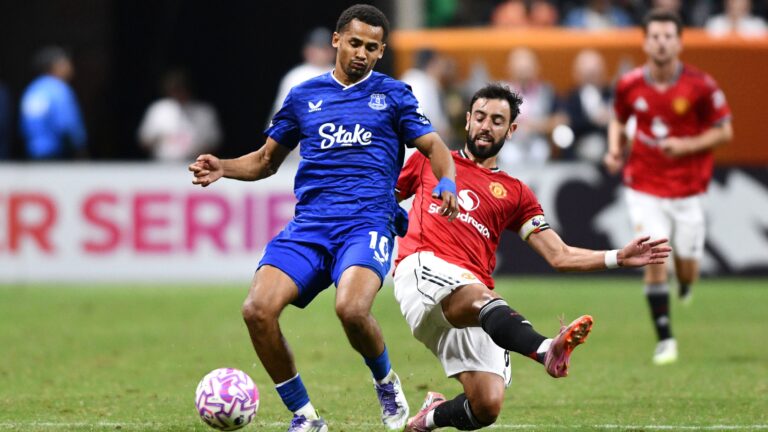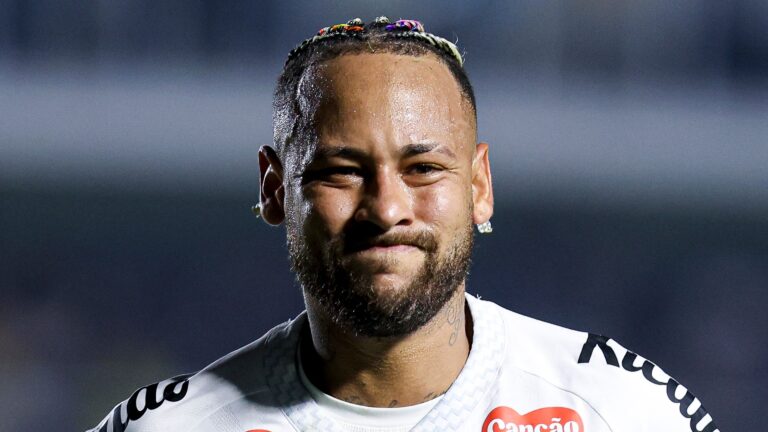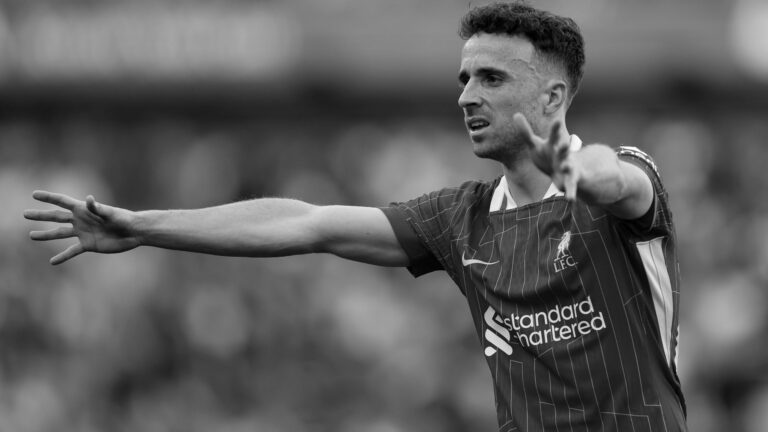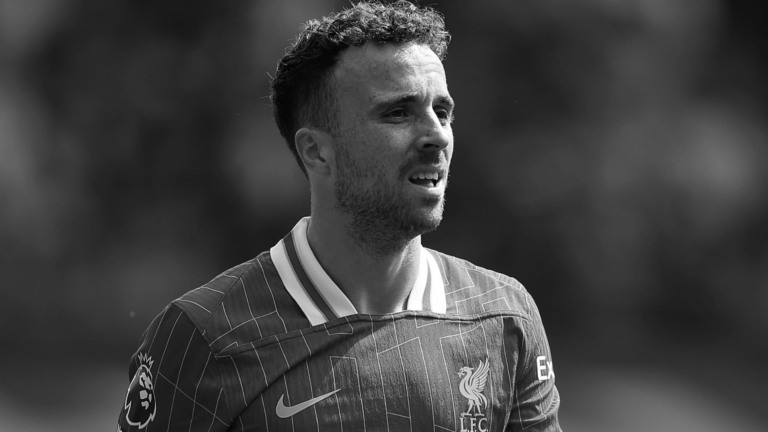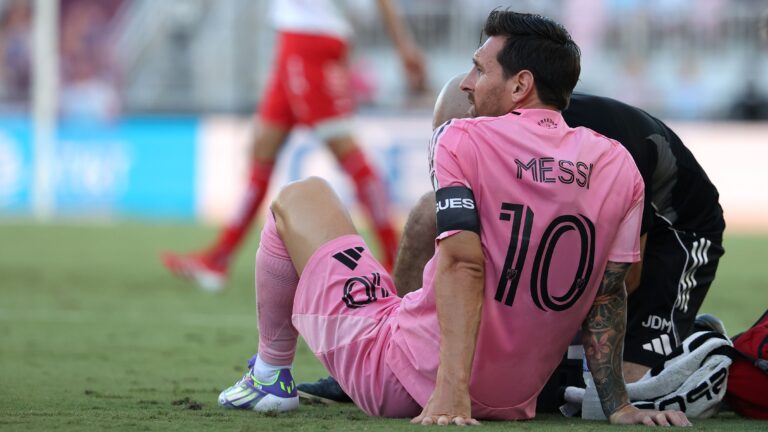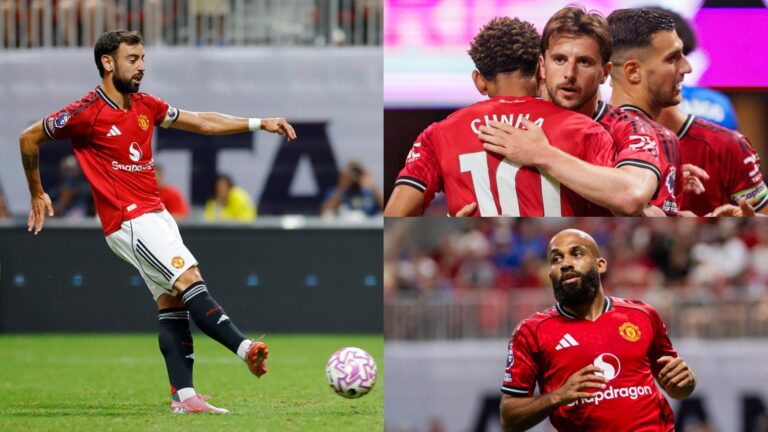Football General Manager
AUSTIN, Texas – Major League Soccer Commissioner Don Garber arrived about 10 to 15 minutes late to his annual midseason All-Star address, looked around the room and smiled as he blamed traffic for his delay.
"I can remember the days when there was no traffic on the way to a game, but it’s great to be here," he said
While there was plenty of attention on Inter Miami superstar Lionel Messi’s decision to skip MLS’s midsummer classic Garber largely focused on growth and change – especially to current roster rules, the calendar and the All-Star format. He revealed more than he has previously about Apple TV consumption and also touched on the recent protests around MLS regarding a lack of a statement about immigration enforcement.
"We have focused on what we’re calling MLS 3.0," he said. "MLS in the next 30 years, a comprehensive strategy to drive our next era of growth, of innovation, global competitiveness, which we think is very important."
BALLGM looks at the biggest takeaways from Garber’s All-Star address.





AUSTIN, Texas – Major League Soccer Commissioner Don Garber arrived about 10 to 15 minutes late to his annual midseason All-Star address, looked around the room and smiled as he blamed traffic for his delay.
“I can remember the days when there was no traffic on the way to a game, but it’s great to be here,” he said
While there was plenty of attention on Inter Miami superstar Lionel Messi’s decision to skip MLS’s midsummer classic, Garber largely focused on growth and change – especially to current roster rules, the calendar and the All-Star format. He revealed more than he has previously about Apple TV consumption and also touched on the recent protests around MLS regarding a lack of a statement about immigration enforcement.
“We have focused on what we’re calling MLS 3.0,” he said. “MLS in the next 30 years, a comprehensive strategy to drive our next era of growth, of innovation, global competitiveness, which we think is very important.”
BALLGM looks at the biggest takeaways from Garber’s All-Star address.
,
Reports emerged this week that MLS could vote again on a schedule shift to better align with FIFA’s international calendar. While Garber did not divulge specifics, he did appear to indicate that there is increasing momentum. The league had previously said no change would take affect until at least 2027.
“If it’s going to happen, it’s going to happen after the 2026 World Cup,” Garber said. “So making this change is seismic. It’s not something we should do lightly. We obviously have teams across multiple climate zones, multiple time zones, unlike any other league in the world. And if we do make the change, we’re not going to go back on that decision.
“There are a number of key benefits to it. Aligning with the world standard, we think, is important for our brand as we try to continue to engage as one of the important, influential leagues in the world. We want to align with on the calendar to be able to be even more engaged on the player transfer market.”
Garber pointed to the league’s growth in transfers, saying MLS could reach $150 million in player sales. He also mentioned that shifting the calendar would mean the MLS postseason would be played earlier – and not go head-to-head with NFL or college football.
“Imagine what that will be when we’re aligned on the international calendar,” Garber said. “We also have our most important big games in the busiest part of the calendar, right? And I think where we are today in the fall might be very or winter might be very different than when the league was founded. The league continues to have its [MLS] Cup later and later in December, and that is a challenge that has to be addressed.”
Garber said that logistics are the biggest barrier.
“How do we ensure that when we make that decision, our facilities are ready for it, our fans are ready for it, and our corporate partners are ready for it? So I would rather get it right, and take our time [then] get it wrong and do it quick.”
Inter Miami was the only MLS team among three competing in the recent Club World Cup to advance out of the group stage – a fact Garber touted. He also said the league wants to achieve more in future tournaments – Miami had the only win in the CWC among MLS teams, as both LAFC and Seattle Sounders fell short.
Garber praised FIFA President Gianni Infantino for his conviction to push forward with revamped 32-team tournament, noting it had plenty of detractors prior to it kicking off. With the 2026 World Cup approaching, Garber said MLS is reviewing its current roster structure to allow potential growth.
He insisted the current structure is tied to data that the league constantly reviews.
“We have rules because we’re looking at data,” he said. “We’re evaluating where we fit and how our allocation of resources can help our league move forward.”
He pointed to Miami’s success in recruiting global stars as a sign the league can be attractive.
“Our clubs are becoming teams of choice for top players, and as Miami was able to prove, be able to stand toe to toe with some tough clubs,” he said. “Now, if the objective is to win the Club World Cup, which it is, we just have to figure out, how do we manage that within the overall economic environment that exists today?”
He added, “As our owners feel that more flexibility will drive more opportunity and more competitiveness, and we will move in that direction.”
MLS and Apple TV, the league’s streaming outlet, have largely been tight-lipped about viewership metrics since their partnership began in 2023. Garber on Wednesday offered some insight into key metrics for the league.
“The Apple deal has grown. We’re averaging 120,000 unique viewers per match,” Garber said. “That’s an increase of almost 50 percent compared to last year. Distribution has helped drive a lot of that now you can get MLS season pass on Comcast or Direct TV. For the first time of any sports league, we’re inviting access to fans through EAFC Mobile.
“It’s clearly one of the most transformational times in the history of our sport. Obviously, we think Major League Soccer is one of the drivers of the growth of the sport here in this country.”
Garber explained some of the complexities in understanding the streaming data, and drawing conclusions.
“Remember that every single game is treated exactly the same on MLS season pass,” he said. “So how do you evaluate the fact that we have games going on simultaneously, way more games going on simultaneous than any other league? We’re not putting one or two games on on a Saturday and then the next game on a Saturday, or a handful of games regionally on a Sunday.
“Aggregate all that, depending on what week it is, you got over a million people that are unique viewers to a match. What we’re struggling with, and I think what the industry is struggling with is that there has been no system to be able to evaluate how people are in a subscription service, how they’re viewing and consuming games. And what is the metric that matters most? It’s an average minute audience. Is it unique viewers? Remember, we’re on a subscription service.”
All-Star games across North America’s sports leagues are declining in viewership. Garber, who took part in announcing that Charlotte will host the 2026 All-Star game in an NFL stadium, said MLS should aim to be ambitious in that event, which immediately follows the World Cup.
“Well, I love the All-Star Game, most leagues probably do,” Garber said. “How do you get your players to love the All-Star Game, your partners to love the All-Star Game, and for fans too? We made a decision many years ago that we didn’t want an exhibition; we wanted a competitive game… We are really focused in Charlotte to make that a really big event coming right out of the World Cup, gain a ton of attention.”
Garber did admit that with MLS and Liga MX continuing to engage with each other in the Leagues Cup, the league is considering how it formats its approach for the next game.
“Maybe it is time for us to evolve the format. As long as we have a competitive game that people care about, I think our All Star game will be as successful as it’s been in the past, and we’ll see how it plays out,” he said.
While Garber would neither confirm nor deny further expansion is a focus, he said the league is putting finishing touches on a substantial change to the manner in which MLS is structured.
“We’ve got a really exciting format that will be ready to be presented once we go through all the formalities of it,” Garber said. “And we’ll talk about that, sometime, either before or at the end of the year press conference. But it’ll be great, and it’s going to make the regular season more meaningful.”
Garber said that one of the priorities for MLS 3.0 is to make each game more meaningful.
“It’ll be more aligned with the rest of the world in terms of how they play their competition, and I think our player format will be really cool, really unique, very different from anything that happens in North America,” he said.
MLS has come under some scrutiny for not taking a more public stance on increased immigration enforcement in the U.S. Rolling Stone recently reported on the league and politics The league’s fan base is 37 percent Hispanic and some fan groups have staged walkouts and silent protests during games.u0026nbsp;The backlash stems from a perceived lack of support for immigrant communities.
Garber stressed the league does not have an official position on immigration enforcement, and mentioned the main priority for the league is that stadiums have a safe environment.
“It’s a complicated issue, for sure,” he said. “And the question is, does the league have a role in protecting people? I don’t know you’re talking about Latinos. I don’t think the league has the ability to serve as an entity to protect anyone. We want our stadiums to stay safe. We want to ensure that we’re having displays that are not going to incite anyone.
“And at the same time, not take care of one audience, and at the same time having to deal with another audience that might be on the other side of this issue. The best way to do that is to have a policy we have which prohibits having political signage or anything to do with legislative acts on display in our stadiums.”
Garber pointed to the practices of some teams, such as LAFC, as a thoughtful approach. That said, the commissioner ruled out a league-wide statement on the issue.
“I understand and sympathize with those that are impacted by this,” he said. “I grew up in a very diverse environment. We are a very diverse league. But we have to be very thoughtful about how we engage in this situation. Our teams, as LAFC has done, if teams want to make a statement that they can. I don’t think any team should be required to.
“Certainly, the league is not, has not, and will not make a statement on this. We just want to continue to do whatever we can to ensure that our games are safe for all of our fans.”



